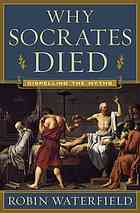
Why Socrates Died
Dispelling the Myths
کتاب های مرتبط
- اطلاعات
- نقد و بررسی
- دیدگاه کاربران
نقد و بررسی

Starred review from March 30, 2009
Socrates and Alcibiades were an unlikely couple: an ugly old philosopher and a charming, intelligent, ambitious and arrogant aristocrat. The fallout from this relationship and an unpopular war toppled the world's most significant philosophical figure. By placing the execution of Socrates against the context of the Peloponnesian War, classicist Waterfield (Xenophon's Retreat
) argues that a guilty verdict against the philosopher, charged with impiety and corrupting Athens's youth, was a rational outcome. “Athens of the last third of the fifth century B.C. was affected by a striking list of stress factors. Old certainties were being undermined by prolonged warfare, morally subversive ideas, population displacement” and other forms of social upheaval. Sitting atop a solid foundation of scholarship, this valuable survey of an important period of ancient history is especially useful as a prelude to texts by Plato, Xenophon and Thucydides. Of the many introductory studies on the Athenian judicial system, the trial of Socrates, the conflict between Athens and Sparta and the reasons that democracy gave way to oligarchy in Athens, this is among the clearest, most well-organized and most concise. 4 pages of illus., maps.

February 15, 2009
Classicist Waterfield examines the trial and conviction of Socrates (c.470399 B.C.E.) in the context of the fifth-century B.C.E. political upheavals in Athens that led to humiliating defeat by Sparta in 404 B.C.E. Waterfield sets the stage for Socrates' trial with a thorough and fascinating account of the democratic process of lawmaking and justice in Athens. In Waterfield's view, citizens of the Greek city-state blamed the catastrophe of defeat on the displeasure of the gods. Who could be more responsible than Socrates, who taught the young to doubt their fathers and question ancient values? His belief in governance by expert seemed to favor oligarchy over traditional democracy. Socrates was also closely associated with leaders of the short and bloody oligarchic coup (404403 B.C.E.) following defeat. Waterfield argues that citizens of the restored democracy blamed the philosopher for his heretical education of the generation that came to maturity during the upheavals, most prominently the adventurer Alcibiades, who represented for many the corruption of values that led to defeat. Waterfield brings to life the ideas and emotions teeming in ancient Athens and makes Socrates' sentence of death seem inevitable. This learned book in clear, concise prose belongs in all libraries.Stewart Desmond, New York
Copyright 2009 Library Journal, LLC Used with permission.

Starred review from April 1, 2009
In The Death of Socrates (2007), Emily Wilson illuminated the mythmaking process that converted the execution of a famous ancient philosopher into a symbolic tableau incorporated into a wide range of religious and political ideologies. In this much-needed complementary study, Waterfield deflates that mythmaking by probing the historical dynamics surrounding the trial itself. The analysis will surprise readers accustomed to viewing Socrates accusers as paranoid defenders of religious superstitions. For a careful parsing of the evidence reveals that when Athenian judges condemned Socrates, they were defending principles still cherished by most twenty-first-century readers: namely, the principles of democracy. Waterfield convincingly establishes that Socrates fell under hostile suspicion largely because of his close ties to young students of deeply anti-democratic sympathies. One of these arrogant young men joined other oligarchs in conspiring against Athens during its bitter war against Sparta; another scripted the atrocities committed by the Thirty Tyrants when they temporarily overthrew Athens democratic government. Waterfield shows that even Socrates own belief in an ideal government by experts legitimated, elitist, not democratic governance. Such a belief, readers soon realize, would have appeared particularly menacing to Athenian democrats traumatized by the twin shocks of external assault and internal discord. Impressive scholarship redefining an iconic event.(Reprinted with permission of Booklist, copyright 2009, American Library Association.)

























دیدگاه کاربران